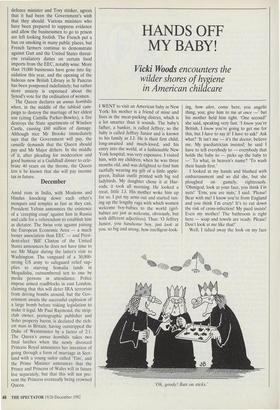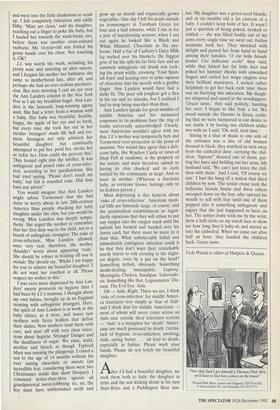HANDS OFF MY BABY!
Vicki Woods encounters the wilder shores of hygiene in American childcare I WENT to visit an American baby in New York: his mother is a friend of mine and lives in the meat-packing district, which is a lot smarter than it sounds. The baby's father, a banker, is called Jeffrey; so the baby is called Jeffrey Junior and is known to his family as J.J. He is their first child, long-awaited and much-loved, and his entry into the world, at a fashionable New York hospital, was very expensive. I visited him, with my children, when he was three months old, and was delighted to find him tactfully wearing my gift of a little apple- green, Italian outfit printed with big red ladybirds. My daughter chose it at Har- rods; it took all morning. He looked a treat, little J.J. His mother woke him up for us. I put my arms out and started tun- ing up the lengthy raga with which women welcome boy-babies to the world (girl- babies are just as welcome, obviously, but with different adjectives). Thus: '0 Jeffrey Junior, you handsome boy, just look at you, so big and strong, how intelligent-look-
ing, how alert, come here, you angelic thing, you; give him to me at once —' but his mother held him tight. 'One second!' she said, speaking very fast. 'I know you're British, I know you're going to get me for this, but I have to say it! I have to ask!' Ask what? 'It isn't me — it's the doctor, believe me. My paediatrician insisted; he said I have to tell everybody to — everybody that holds the baby to — picks up the baby to —' To what, in heaven's name? 'To wash their hands first.'
I looked at my hands and blushed with embarrassment and so did she, but she ploughed on gamely, righteously. `Ohmigod, look at your face, you think I'm nuts!"Erm, you are nuts,' I said. 'Please! Bear with me! I know you're from England and you think I'm crazy! It's to cut down the risk of cross-infection! My paed insists! Even my mother! The bathroom is right here — soap and towels are ready. Please! Don't look at me like that!'
Well, I tidied away the look on my face 'Oh, goody! Bats on sticks.' and went into the little cloakroom to scrub up. I felt completely ridiculous and oddly filthy. 'Mine are clean,' said my daughter, reaching out a finger to poke the baby, but I hauled her towards the wash-basin, too, before there was another cross-cultural outburst. My 14-year-old son folded his grimy hands over his chest. Not touching it, OK?
J.J. was worth the wash, wrinkling his pretty nose and sneezing an alert sneeze, and I forgave his mother her battiness; she came to motherhood late, after all, and perhaps she had an over-zealous paediatri- cian. But next morning I cast an eye over the Ann Landers column in the New York Post as I ate my breakfast bagel. Ann Lan- ders is the famously long-running agony aunt. She had a letter from a woman with a baby. Her baby was beautiful, healthy, happy, the apple of her eye and so forth, but every time she took her out in her stroller 'strangers' made life hell and tor- ment. Strangers not only admired her beautiful daughter, but continually attempted to pat her, prod her, stroke her or tickle her. How could she prevent this? They leaned right into the stroller. It was unhygienic and posed risks of cross-infec- tion, according to her paediatrician. She had tried saying, 'Please don't touch my baby,' but felt it sounded rude. Did Ann have any advice? You would imagine that Ann Landers might advise Tormented that she had more to worry about in late 20th-century America than people chucking her baby daughter under the chin, but you would be wrong. Miss Landers was deeply sympa- thetic. She urged the mother to remember that her first duty was to the child, not to a bunch of unhygienic strangers. The risks of cross-infection, Miss Landers allowed, were very real; therefore, the mother shouldn't worry about appearing 'rude'. She should be robust in fending off tout le monde. She should say, 'Whilst I am happy for you to admire my beautiful daughter, I do not want her touched at all. Please respect my wishes in this.'
I was even more depressed by Ann Lan- ders' snooty protocols on hygiene than I had been by J.J.'s mamma. I thought about my own babies, brought up in an England teeming with unhygienic strangers. Here, the spirit of Ann Landers is at work in the baby clinics, as it were, and issues new mothers with fierce leaflets that define their duties. New mothers read them with care, and start off with very clear inten- tions about hygiene, Stranger Danger and the deadliness of sugar. We rinse, scald, sterilise and bleach as though Typhoid Mary was running the playgroup. I raised a son to the age of 14 months without his ever tasting chocolate or sweets (an incredible feat, considering there were two Christmases inside that short lifespan). I remained holier-than-thou against all grandparental sweet-lobbying: no, no, the boy must have unblemished teeth and grow up on muesli and organically grown vegetables. One day I left his pram outside an ironmongers in Turnham Green for four and a half minutes, while I ran in for a pair of hairdressing scissors; when I ran out again he looked like a Black and
White Minstrel. Chocolate to the eye- brows. Half a bar of Cadbury's Dairy Milk
lay melted over his blankets, the biggest
grin of his life split his fat little face and an extremely unhygienic old drunk was rock-
ing the pram wildly, crooning 'Your Span- ish Eyes' and leaning over to poke squares of chocolate into his mouth with a grubby finger. Ann Landers would have had a dicky fit. The poor old jongleur got a flea in his ear and no mistake, but I realised I had to stop being mueslier-than-thou.
Ann Landers speaks for great swathes of middle America and her measured responses to its problems have the ring of truths universally acknowledged. Clearly, most Americans wouldn't agree with me that J.J.'s mother was temporarily bats and Tormented over-protective to the point of neurosis. Nor would they agree that a deli- cious baby, like Windsor Castle or views of Shap Fell at sundown, is the property of the nation, and must therefore submit to having its chin chucked and its curls twirled by the community at large. And so must its mother. (Whereas a fractious baby, as everyone knows, belongs only to its feckless parent.) Most depressing is this hysteria about 'risks of cross-infection'. American medi- cal bills are famously large, of course, and the paramedical establishment so legen- darily rapacious that they will refuse to put any oxygen into the oxygen mask until the patient has located and handed over his Amex card, but there must be more to it than that. What unbelievably lethal and immediately contagious infection could it be that they don't want their remarkably sturdy bairns to risk crossing in the slight- est degree, even by a pat on the head? Something hellish, obviously. Something death-dealing, inescapable. Leprosy.
Meningitis. Cholera. Smallpox. Tuberculo- sis. Something like that. Legionnaires' Dis- ease. The Evil Eye. Aids.
Oh — Aids. Right. There we are. I think 'risks of cross-infection' for middle Ameri- ca translates very simply as 'fear of Aids' and I think that for middle Americans — most of whom will never come across an Aids case outside their television screens — 'Aids' is a metaphor for 'death'. Ameri- cans are much possessed by death. Germs, lack of hygiene, cross-infection, smoking, Aids, eating butter . . . all lead to death, especially in babies. Please wash your hands. Please do not touch my beautiful daughter.
After I'd had a beautiful daughter, we took them both to Italy: the daughter in arms and the son kicking about in his new Start-Rites and a Paddington Bear sun- hat. My daughter was a green-eyed blonde, and at six months old a fat cartoon of a baby. I couldn't keep hold of her. It wasn't just a question of being poked, stroked or tickled — she was lifted bodily out of my arms every single time we went out. Italian mammas took her. They shrieked with delight and passed her from hand to hand among their families. '0 che bella bionda bimba! Cite bellissimi °eche they said, while they kissed her fat little feet and poked her hamster cheeks with unwashed fingers and curled her wispy ringlets over their brilliant manicures. I waited rather helplessly to get her back each time: there was no hurrying this adoration. My daugh- ter simpered and cooed at the worshippers. `Grazie tanto,' they said politely, handing her over. I began to like Italy a lot. We stood outside the Duomo in Siena, realis- ing that we were hampered in our desire to see inside it by having two children under two with us. I said, 'Oh, well, next time.'
Sitting in a slice of shade to one side of the entrance was a line of old women dressed in black: they watched us turn away from the cathedral door, carrying the chil- dren. 'Signora!' shouted one of them, pat- ting her knee and holding out her arms. My husband said, 'We can't just leave the chil- dren with them.' And I said, 'Of course we can.' I had the hang of a nation that liked children by now. The senior crone took the bellissima bionda bimba and three others swooped down on the boy, who opened his mouth to yell with fear until one of them popped into it something unhygienic and sugary that she just happened to have on her. The senior crone took me by the wrist, drew a half circle on my watch face to show me how long they'd baby-sit and waved us into the cathedral. When we came out after half an hour, they handed the children back. Grazie tanto.
Vicki Woods is editor of Harpers & Queen.











































































































 Previous page
Previous page